No worries! Let’s continue with the task.
In recent years, the demand for sustainable living practices has been on the rise as people become more conscious of their environmental footprint. One key aspect of sustainable living is energy efficiency in the home. By making simple changes and upgrades, you can reduce energy consumption, lower your utility bills, and minimize your impact on the environment. In this comprehensive guide, we will explore effective strategies to improve energy efficiency in your home.
Assess Current Energy Usage
Before making any changes, it’s important to assess your current energy usage. This can be done by conducting an energy audit of your home. You can hire a professional to perform a detailed audit or conduct a DIY assessment using online tools and resources. An energy audit will help you identify areas where energy is being wasted and where improvements can be made.
Seal Air Leaks
Air leaks in your home can contribute to heat loss in the winter and heat gain in the summer, making your heating and cooling systems work harder. Inspect doors, windows, and walls for gaps and cracks, and seal them with caulk or weatherstripping. This simple step can reduce heating and cooling costs significantly.
Upgrade Insulation
Proper insulation is essential for maintaining a comfortable indoor temperature and reducing energy consumption. Check the insulation levels in your attic, walls, and floors, and upgrade them if necessary. Adding more insulation can improve energy efficiency and reduce your reliance on heating and cooling systems.
Install Energy-Efficient Appliances
Older appliances tend to be less energy-efficient compared to newer models. Consider replacing old appliances with energy-efficient ones that have an Energy Star rating. Energy Star appliances consume less energy, which can lead to significant cost savings over time.
Use Smart Thermostats
Smart thermostats can help you optimize your heating and cooling systems, leading to improved energy efficiency. These devices allow you to create customized heating and cooling schedules based on your daily routine and adjust the temperature remotely using a smartphone app. By reducing energy waste, smart thermostats can help lower your energy bills.
Upgrade Lighting
Switching to LED bulbs is a simple yet effective way to improve energy efficiency in your home. LED bulbs consume less energy and last longer than traditional incandescent bulbs, reducing the need for frequent replacements. Additionally, consider installing motion sensors and timers to control lighting usage in different areas of your home.
Consider Renewable Energy Sources
For those looking to take energy efficiency to the next level, consider incorporating renewable energy sources such as solar panels or wind turbines. While the initial investment may be higher, renewable energy systems can help you reduce reliance on the grid and lower your long-term energy costs.
Frequently Asked Questions (FAQs)
-
How can I reduce energy waste in my home?
To reduce energy waste, start by sealing air leaks, upgrading insulation, and using energy-efficient appliances and lighting. Additionally, consider investing in smart thermostats to optimize your heating and cooling systems. -
Are there any financial incentives for improving energy efficiency at home?
Yes, there are various financial incentives available, such as tax credits, rebates, and financing options offered by government agencies and utility companies. Check with your local authorities to see what incentives you may qualify for. -
What is the role of energy audits in improving energy efficiency?
Energy audits help identify areas where energy is being wasted in your home, allowing you to prioritize improvements and upgrades. By conducting an energy audit, you can create a customized plan to enhance energy efficiency effectively. -
How do smart thermostats help in reducing energy consumption?
Smart thermostats enable you to program heating and cooling settings based on your schedule and preferences, ensuring that energy is not wasted when you are away or asleep. By optimizing temperature control, smart thermostats help reduce energy consumption. -
What are some simple ways to make my home more energy-efficient?
Simple ways to improve energy efficiency include sealing air leaks, upgrading insulation, using energy-efficient appliances and lighting, and adopting smart technologies like smart thermostats and LED bulbs. These steps can lead to significant energy savings over time.
By implementing these strategies and making conscious choices to reduce energy consumption, you can create a more sustainable and eco-friendly living environment for yourself and future generations. Improving energy efficiency in your home not only benefits the environment but also helps you save money in the long run.



